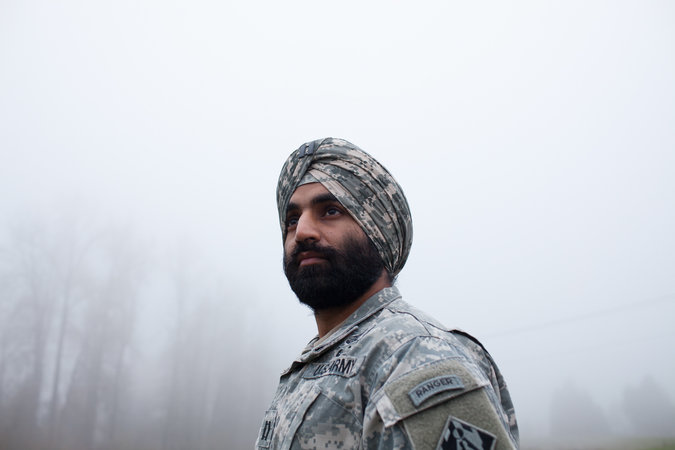
Culminating a multi-year legal battle with the US Army, Captain Simratpal Singh has won the right to wear his beard and turban while serving in the US Army. Upon joining West Point in 2006, Singh — a lifelong Sikh — was dismayed to learn that the military was hostile to the idea of religious accommodation for his faith. NBC News reports that since 1981 when the US Army instituted stricter grooming standards, only three Sikh American officers have ever received religious accommodations for their articles of faith.
As a cadet, Singh filed repeatedly for a religious accommodation for his beard and turban, and was denied each time. Finally, Singh made the heartbreaking decision to shave his beard — an act Singh says he immediately regretted, but felt was necessary in order to continue his military service. Singh went on to become a highly decorated Army Ranger who distinguished himself on harrowing missions in Afghanistan’s Kandahar Province helping to disarm IEDs, and in training exercises with the South Korean Army.
In 2015, Singh began work with The Sikh Coalition to once again file for his own religious accommodation from the Army to permit his articles of faith.
Sikh Americans should not have to make the impossible choice between observing their faith and doing the routine and not-so-routine things — like boarding an airplane or going out to the movies or serving in the military — that non-Sikhs do every day without harassment. Yet, we live in a world where Sikhs find themselves the victims of religious intolerance, bullying and even heinous violence simply for displaying articles of their faith on their person.
In Sikhism, observers wear several articles of faith on their person, including a wooden comb, an iron bracelet,a small ceremonial dagger, and unshorn hair wrapped in a turban. However, over the last several years, Sikh Americans have found their articles of faith targeted by local bans. The Sikh Kirpan — a small blade typically no more than 5 inches in length, roughly the size of a large Swiss Army knife — is selectively disallowed everywhere from the Canadian legislature to American movie theatres. Meanwhile, Sikhs worldwide have also found themselves harassed for their turbans: last month, Sikh American actor Waris Ahluwalia (The Grand Budapest Hotel) was banned from flying home to New York from Mexico City after he refused to allow the TSA to remove his turban for inspection.
Similarly, the US Army initially continued their refusal to allow Singh to serve with his beard and turban intact, even though the Army says it “places a high value on the rights of Soldiers to observe tenets of their respective religions” and has historically permitted the wearing of other religious articles of faith. Instead, the Army delayed responding to Singh’s request, even after 27 retired US Army generals joined an open letter calling for the US Army to grant Sikhs this right. Only in December did the Army relent, at last granting Singh a temporary accommodation contingent upon subjecting Singh to an unprecedented -barrage of testing. The broad extent of those tests were ruled last month to be discriminatory and unlawful, and yesterday the US Army relented and made Singh’s temporary accommodation essentially permanent.
Singh reacted to the decision, saying:
“My military service continues to fulfill a lifelong dream. My faith, like many of the soldiers I work with, is an integral part of who I am. I am thankful that I no longer have to make the choice between faith and service to our nation.”
Although a major victory that estbalishes important modern precedent for Sikh Americans in the military, Singh’s decision only grants permission for himself. Currently, three other Sikh Americans — Specialist Kanwar Singh, Specialist Harpal Singh and Private Arjan Singh Ghotra — have worked with the Sikh Coalition to file a federal anti-discrimination lawsuit seeking their own right to wear their articles of faith as active soldiers. Each is seeking the right to maintain their beard and turban through Basic Combat Training.
“We would like the opportunity, like every other American, to proudly serve,” said SPC Kanwar Singh, who enlisted in the Massachusetts Army National Guard. “I look forward to joining my battalion for training and making the diverse state of Massachusetts proud.”
The outcome of that federal lawsuit is still pending. If you would like to support these efforts, head over to The Sikh Coalition for more information and to donate.

